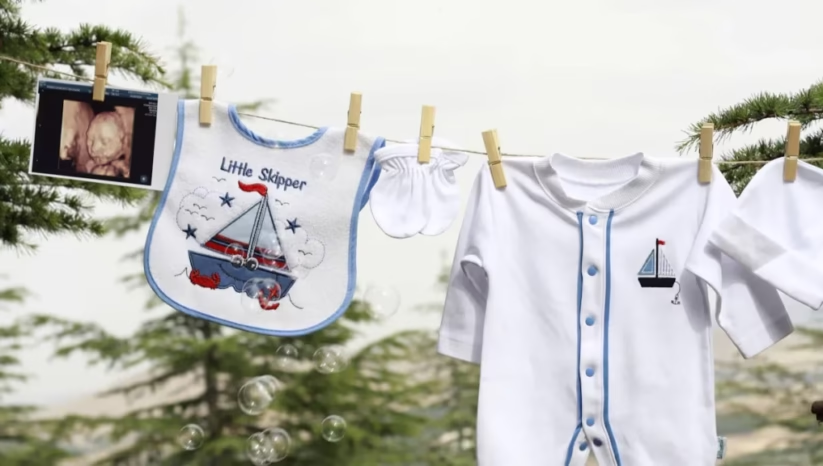How to Select the Right Baby Clothes Supplier for Your Needs
How to Select the Right Baby Clothes Supplier for Your Needs
To pick the right baby clothes supplier, look at quality and safety. Think about ethical sourcing and if they are honest. Check their prices and if they are reliable. Good customer support is important too. You want baby clothes that are soft and safe. Always look for soft fabrics and strong stitching. Good support helps you when you need it. Pick a supplier who shares your values.
Key Takeaways
-
Always put quality and safety first when picking baby clothes. Choose soft fabrics like cotton because they are kind to sensitive skin.
-
Look for fabric certifications such as Oeko-Tex and GOTS. These show the materials are safe and come from good sources.
-
Pick suppliers who have strong customer support. Good communication helps fix problems fast and builds trust.
-
Think about ethical sourcing practices. Suppliers who share how they make their products earn your trust.
-
Check the prices and what you get for your money. Compare costs and make sure you get good products that last.
No idea how to make children’s clothes? This is the definitive, all-in-one guide the kids’ apparel industry doesn’t want you to have.
Quality and Safety in Baby Clothes
Best Baby Clothes Materials
When picking baby clothes, comfort and safety come first. The best baby clothes use soft, high-quality fabrics. Cotton is a top choice for many parents and suppliers. It feels soft and lets air through, so it is good for sensitive skin. Cotton also helps babies stay cool when it is hot. Wool and other rough fabrics can bother the skin, so do not use them next to the skin. Sleepwear should have a low fire hazard label to keep babies safe. Tightly woven fabrics help block the sun, which is good for outdoor clothes.
Tip: Pick soft fabrics like cotton for daily use. Check labels for safety features. Do not buy clothes with small parts that babies could choke on.
-
Cotton is soft and lets air through.
-
Cotton is good for sensitive skin and keeps babies cool.
-
Sleepwear needs a low fire hazard label.
-
Stay away from things that could choke or strangle.
-
Tightly woven fabrics help protect from the sun.
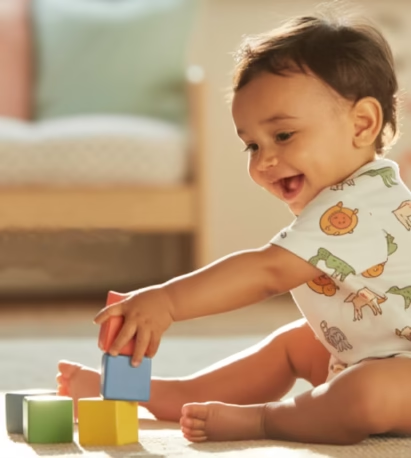
With 17 years of experience, petelulu provides a full range of
manufacturing services from design to delivery.
Start from scratch , Create your own brand.
17+
serving top 10 American brands
15+
serving top 10 Australian brands
12+
serving top 10 European brands
Contact us to get the quote.👇
Fabric Certifications
Look for fabric certifications when buying stylish, high-quality kids clothing. These show the materials meet strict safety and environmental rules. Suppliers who use certified fabrics care about quality and doing the right thing. The table below shows the most well-known certifications for baby clothes:
|
Certification |
Description |
|---|---|
|
Makes sure textiles are safe and free from harmful stuff. |
|
|
ZQ Certified |
Proves good animal care in wool making. |
|
RWS/RAS |
Checks animal welfare and tracks wool from farm to product. |
|
Bluesign Certified |
Looks at safety and the environment in the textile supply chain. |
Always check for these certifications on labels or supplier websites. Certified fabrics help you know your baby’s clothes are safe and made the right way.
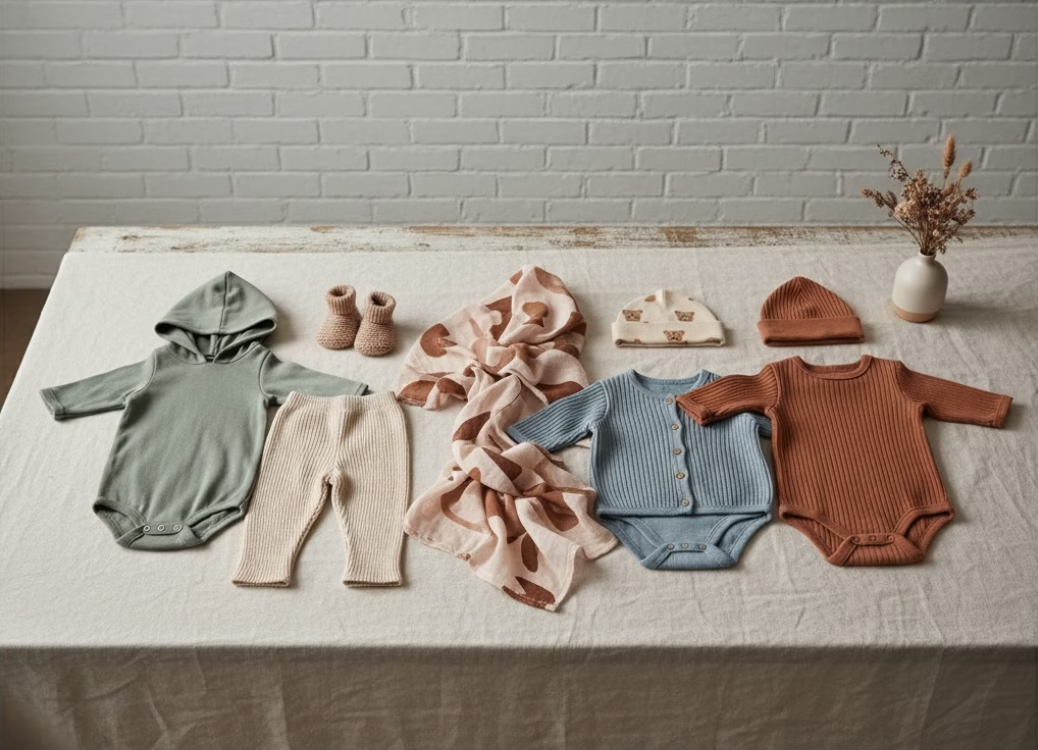
Safe Stitching and Finishing
Good baby clothes are not just about fabric. Strong stitching makes clothes last longer and keeps babies safe. Top suppliers set clear rules for each piece of clothing. They check the fabric and how it is sewn. Inspections happen before, during, and after making the clothes to keep quality high. Special tests check if the fabric is strong and safe. Many makers work with outside experts to check quality and give advice.
-
Suppliers set clear quality rules for every piece.
-
Inspections happen at important steps to keep things the same.
-
Special tests check strength and safety.
-
Outside experts help make sure quality is high.
When you pick a supplier who cares about quality and safety, your child gets the best baby clothes for comfort and protection.
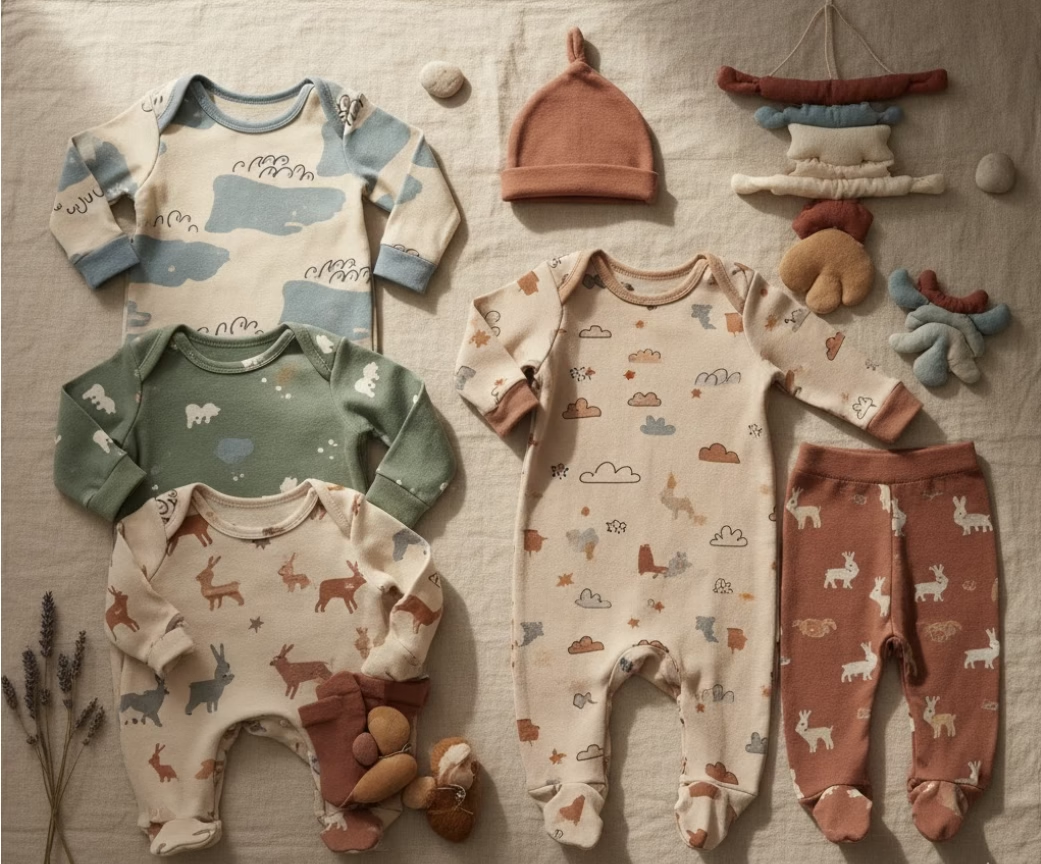
Ethical Sourcing and Transparency
Picking a baby clothes supplier who cares about ethical sourcing and being open helps you trust them. It also makes you happy with your choice for a long time. You should know where your baby’s clothes are made. You should know how they are made too. This helps you feel calm and helps the planet.
Supply Chain Transparency
Supply chain transparency means you can follow each step in making the clothes. You can see where the materials come from. You can see how workers are treated. Many people now want proof that clothes are made the right way. Brands that share this information earn your trust. You will want to buy from them again. If suppliers hide things, you may not trust them. They could get in trouble for bad actions.
| Aspect | Importance | Risks of Non-Transparency |
|---|---|---|
| Ethical Practices | Makes sure workers are treated fairly and human rights are followed | Workers may be hurt or forced to work. Children may be used. |
| Consumer Trust | Helps you believe in the brand and its products | People may stop buying and the brand could lose respect |
| Environmental Responsibility | Helps the planet and uses better ways to make clothes | The earth could be harmed and people may think badly of them |
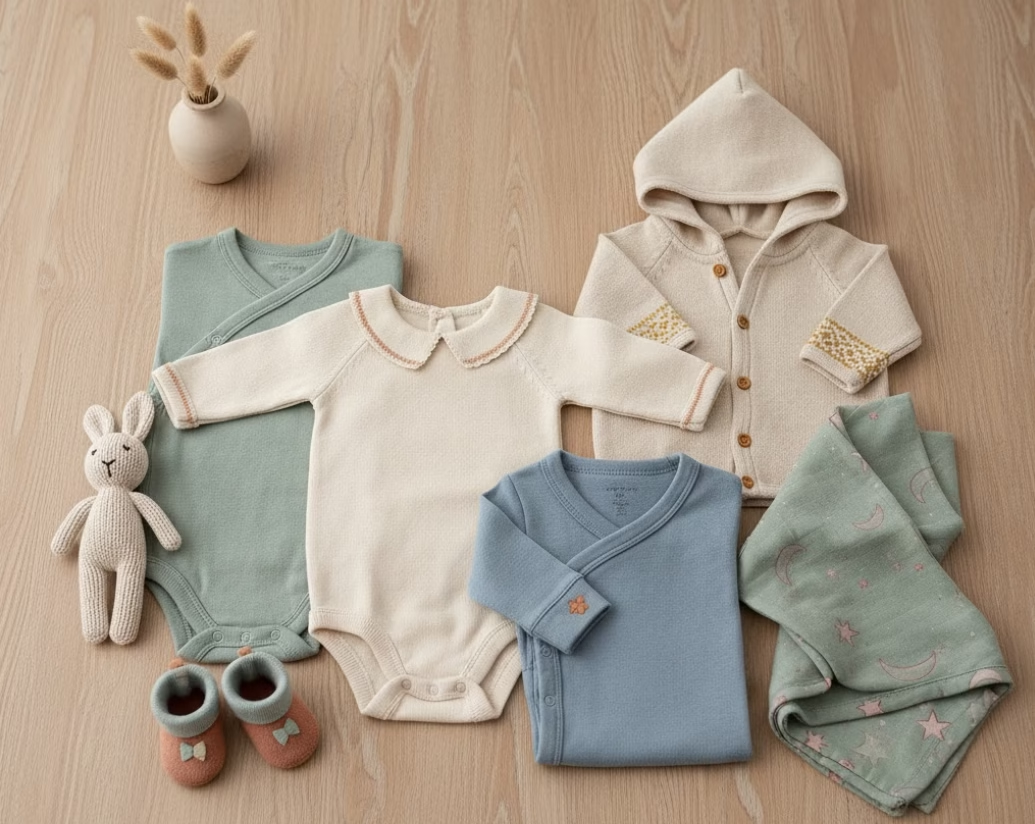
Ethical Manufacturing Practices
Ethical manufacturing makes clothes better and helps the brand look good. You get clothes made with organic and eco-friendly materials. These are safer and last longer. Suppliers who use safe dyes, like water-based dyes, help keep the earth clean. These dyes are gentle on your child’s skin. Fair labour means workers get fair pay and safe places to work. This shows the supplier wants to do what is right.
-
Organic materials make clothes safer and stronger.
-
Safe dyes help babies and the earth.
-
Fair labour matches your values and builds trust.
Environmental Standards
Environmental standards in making baby clothes help keep the earth safe for the future. You should pick suppliers who follow strict rules for the environment. They should have well-known certifications. Two important certifications to look for are:
| Certification | Description |
|---|---|
| GOTS | This is a world standard for organic textiles. It needs at least 70% organic fibres and strong rules for the environment and people. |
| OEKO-TEX | This is a global certification. It checks that textiles do not have harmful stuff. It keeps babies and children safe. |
When you pick suppliers with these standards, you help make baby clothes that are safe, fair, and good for the planet.
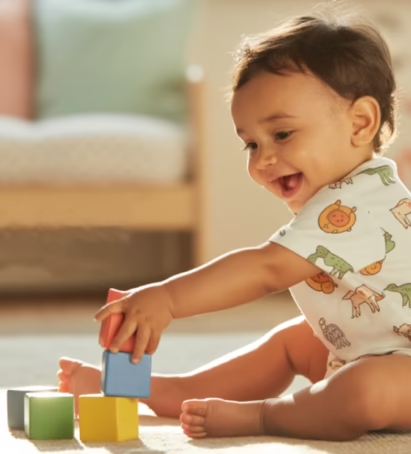
With 17 years of experience, petelulu provides a full range of
manufacturing services from design to delivery.
Start from scratch , Create your own brand.
17+
serving top 10 American brands
15+
serving top 10 Australian brands
12+
serving top 10 European brands
Contact us to get the quote.👇
Strategy Execution: The Color and Pattern Emotional Value Matrix
To maximize emotional value, brands must quantify the potential emotional impact of colors and patterns during the design phase.
| Design Element | Recommended Color/Pattern | Core Emotional Value (Designer Goal) | Design Action (Active Voice) |
|---|---|---|---|
| Main Color Palette | Ash Blue, Oat Beige, Sage Green (Low Saturation) | Security, Tranquility | We ensure all basic colorways follow the psychological “calmness” principle. |
| Pattern Theme | Abstracted nature elements, linear patterns | Tenderness, Connection | The team integrates patterns into the brand narrative to enhance baby clothing marketing efficiency. |
| Accent Colors | Small amounts of low-saturation Mustard Yellow, Caramel | Joy, Positivity | We strategically use accent colors to differentiate our baby clothing brand. |
Customisation Options
Customisation options make a baby clothes supplier special. You might want your own designs, special fabrics, or small orders. The best suppliers have many choices, like organic cotton and bamboo clothes. Some let you order as few as 10 pieces. This makes it easy to try new things or fill special orders.
|
Product Range |
Pricing |
Customer Satisfaction |
|---|---|---|
|
Organic cotton, bamboo, custom styles |
Safety and good support are most important |
|
|
Small minimum orders (from 10 pieces) |
Discounts for big orders, cheaper shipping |
Verified reviews show if the supplier is reliable |
If you pick a supplier with good customisation, you can build your own brand and keep your customers happy.
Pricing and Value
Fair Pricing
You want to make sure you pay a fair price for baby clothes. A good supplier sets prices that match the materials, design, and effort used. You should compare prices from different suppliers. This helps you see if the cost matches the value you get. Some suppliers offer discounts for larger orders. Others may include free samples or shipping. Always check what is included in the price before you decide.
Tip: Ask for a clear price list. This helps you avoid hidden costs and plan your budget.
Value for Money
Value for money means you get the best mix of price and quality. You should not only focus on the lowest price. High-quality baby clothes last longer and feel better for your child. When you choose a supplier, check the stitching, fabric, and finishing. These are important things to look for in baby clothing. A good supplier will show you samples or photos of their work. You can also ask about the care instructions. Easy-to-wash clothes save you time and money.
-
Check the fabric and stitching.
-
Ask for samples or photos.
-
Make sure the clothes are easy to care for.
Return and Exchange Policies
A clear return and exchange policy gives you peace of mind. Sometimes, you may need to return items if they do not fit or meet your needs. Reliable suppliers explain their policies in detail. They tell you how long you have to return items and what steps to follow. You should read these rules before you order. This helps you avoid problems later.
|
Policy Feature |
Why It Matters |
|---|---|
|
Return Timeframe |
Lets you act quickly if needed |
|
Condition Required |
Tells you how to return items |
|
Exchange Options |
Gives you more flexibility |
A supplier with a fair policy shows they care about your satisfaction. This builds trust and helps you feel confident in your choice.
Customer Service and Reliability
Communication and Support
It is important to talk clearly with your baby clothes supplier. Good customer support helps you fix problems fast. You will always know what is happening with your orders. You should get quick answers to your questions. A supplier who listens to you builds trust. This makes you feel important. Many suppliers help by email, phone, or online chat. You can ask about products, order updates, or when things will arrive. If you have a problem, good support gives you answers right away.
Tip: Pick a supplier who has clear ways to contact them and replies fast. This makes everything easier and less stressful for you.
Delivery and Consistency
You need shipping you can count on. You want your orders to come on time and in good shape. Top suppliers use smart plans to keep items ready to send. They keep extra stock so they do not run out. Inventory allocation helps products move quickly to you. Suppliers watch what people buy and plan for busy times. They check how long it takes to get products from their suppliers.
-
Extra stock keeps products ready to send.
-
Inventory allocation helps ship orders fast.
-
Watching sales and demand helps suppliers plan.
-
Checking lead times stops late deliveries.
When shipping is reliable, you trust the supplier more. Getting your orders on time makes you want to buy again. When delivery and quality stay the same, you stay loyal and your business can grow.
You should pick a baby clothes supplier who matches your needs. Make sure they care about quality and safety. Check if they use ethical sourcing and are open about their work. Look at their prices and see if they are reliable. Good customer service is important too. These things help you make smart choices. They keep your child safe and comfortable.
Organic cotton grows without fake pesticides. This makes it safer for babies. It does not have bad chemicals that can hurt a baby’s skin. It is a healthier choice for baby clothes.
-
Choosing organic baby clothes helps the planet. It stops water from getting dirty.
-
Ethical choices mean workers get fair pay and safe jobs.
|
Factor |
Benefit |
|---|---|
|
Quality |
Clothes last longer and feel nice |
|
Transparency |
Helps you trust the supplier |
|
Ethical sourcing |
Makes sure workers are treated well |
Using these points gives you peace of mind. You will feel happy with your choice for a long time.
FAQ
What certifications should you look for in baby clothes suppliers?
Look for certifications like GOTS and OEKO-TEX. These show the supplier uses safe and organic materials. Certified suppliers follow strict safety and environmental rules.
How can you verify a supplier’s ethical practices?
Ask the supplier about their supply chain and labour rules. Good suppliers share details about their factories and working conditions. Check for third-party audits or reports.
Why is customisation important when choosing a baby clothes supplier?
Customisation lets you make special designs and pick fabrics you like. You can meet your brand’s or customers’ needs. Suppliers with custom options help you stand out.
What should you do if you have issues with your order?
Contact the supplier’s customer service team straight away. Good suppliers reply quickly and give clear answers. Always read their return and exchange rules before you order.
About the author
Xhiney, founder of Petelulu, brings over 20 years of experience in children’s wear design, production, and international trade. A contributor to Children’s Wear and Junior magazines, Xhiney has spent 17 years working with high-end children’s wear brands in Europe and the U.S., offering expert insights and support.
